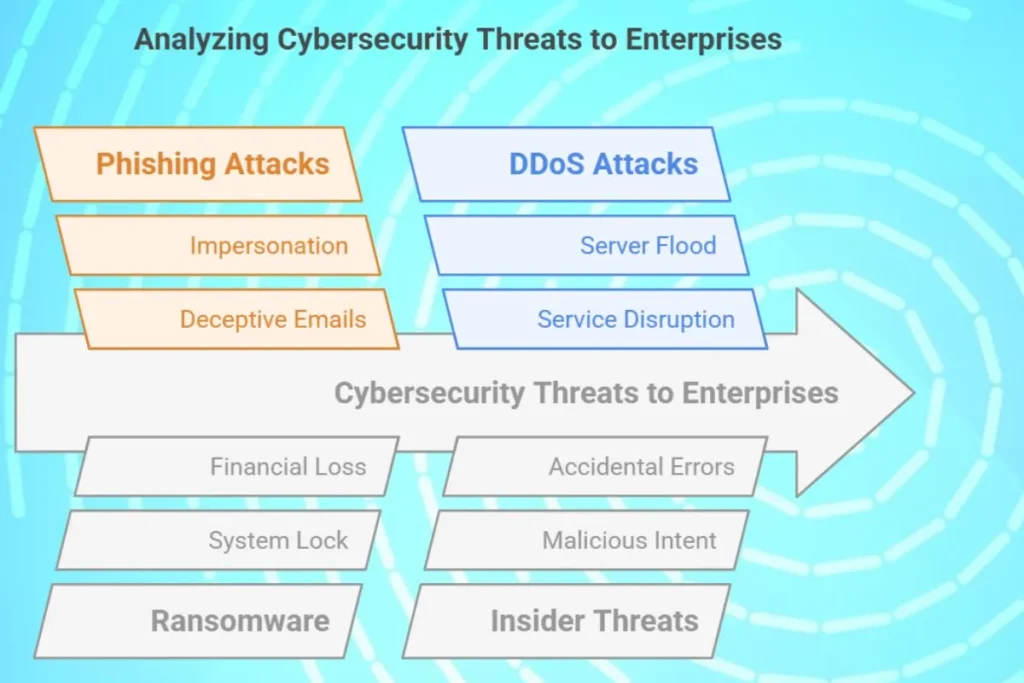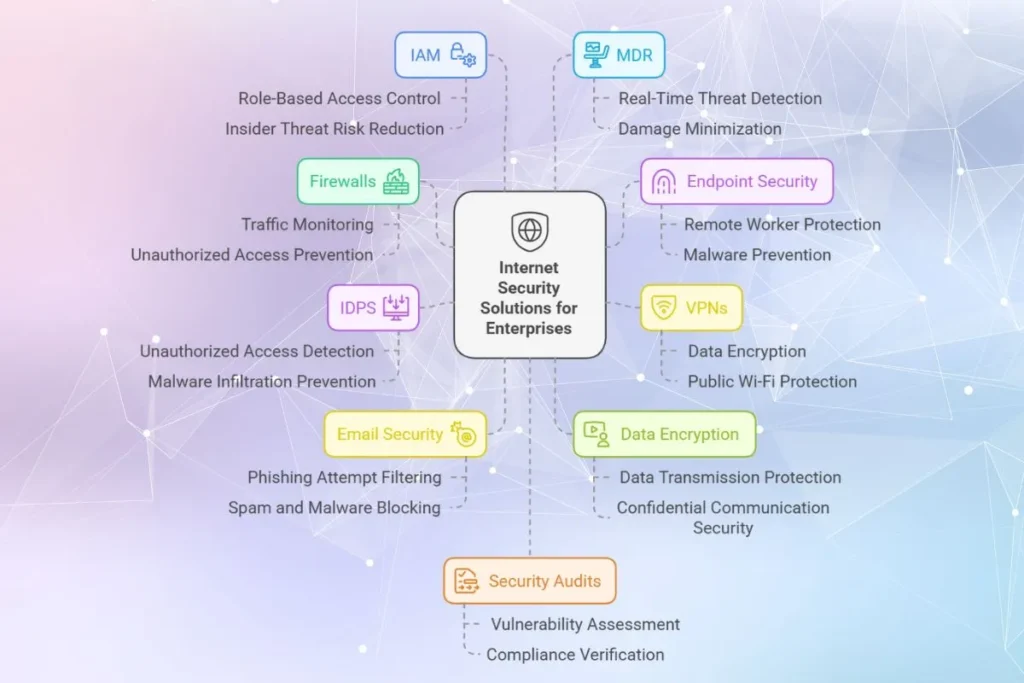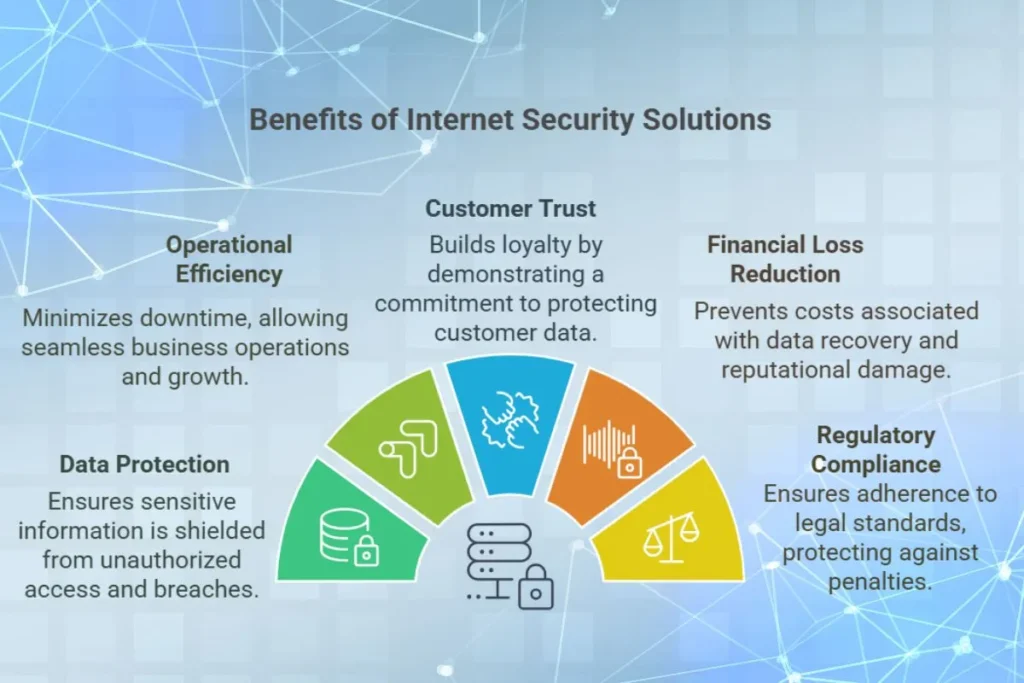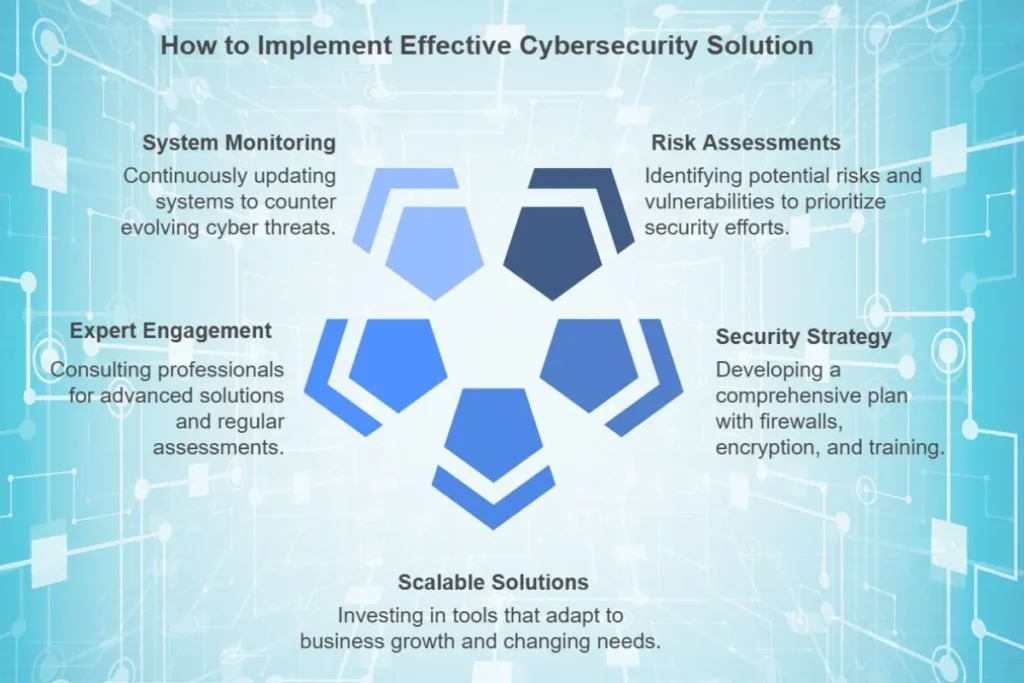Enterprises rely heavily on the internet for daily operations, hence strong internet security or cybersecurity solutions are very essential. With increasing cyber threats targeting businesses, organizations need advanced measures to protect sensitive data, maintain customer trust and ensure uninterrupted operations.
In this blog post, we will discuss the importance of internet security solutions for enterprises, common threats they face and key solutions to reduce the risks. By adopting comprehensive internet security measures, enterprises can protect their digital assets and strengthen their overall security.
Importance of Internet Security for Enterprises
1. Protecting Sensitive Data
Enterprises store vast amounts of sensitive data, including employee records, customer details and proprietary information. Cyberattacks such as data breaches can expose this information, leading to financial losses and reputational damage. For example, a breach in an enterprise’s customer database could result in the theft of personal and financial information.
2. Ensuring Business Continuity
Cyberattacks like ransomware can disrupt operations by locking enterprises out of their systems. This can lead to significant downtime, loss of revenue and operational chaos. For instance, a global logistics company experiencing a ransomware attack could face delays in shipments, affecting its clients worldwide.
3. Compliance with Regulations
Many industries are subject to data protection regulations such as GDPR, HIPAA, or CCPA. Enterprises that fail to comply with these standards can face hefty fines and legal consequences. For example, an enterprise in the healthcare sector must implement internet security measures to safeguard patient data and comply with HIPAA requirements.
4. Maintaining Customer Trust
Customers expect enterprises to prioritize their data security. A single cyber incident can break trust and harm the enterprise’s reputation. For example, an e-commerce platform’s inability to protect payment details could drive customers to competitors.
Common Internet Security Threats for Enterprises
1. Phishing Attacks
Phishing involves tricking employees into sharing sensitive information, such as login credentials or financial details, through deceptive emails or websites. For example, attackers might impersonate a trusted vendor, requesting an enterprise’s staff to provide login details.
2. Ransomware
Ransomware locks systems or encrypts data, demanding a ransom for its release. Enterprises targeted by ransomware can experience prolonged downtime and financial losses. For instance, a manufacturing company could face production halts due to a ransomware attack on its network.
3. Distributed Denial of Service (DDoS) Attacks
DDoS attacks flood enterprise servers with excessive traffic, rendering them inaccessible. This can disrupt websites and critical services, leading to customer dissatisfaction. An example is an online retailer losing sales during peak shopping periods due to a DDoS attack.
4. Insider Threats
Insider threats, whether intentional or accidental, pose significant risks. Employees with malicious intent or those making errors can compromise systems. For example, an employee accidentally downloading malware could expose the entire network to threats.
5. Advanced Persistent Threats (APTs)
APTs are long-term attacks where cybercriminals penetrate networks to steal sensitive data over time. Enterprises in industries like finance and defense are particularly vulnerable to APTs, which often go undetected for extended periods.

Key Internet Security Solutions for Enterprises
1. Firewalls
Firewalls create a protective barrier between an enterprise’s internal network and external threats. They monitor and control traffic to prevent unauthorized access. For example, an enterprise can use next generation firewalls to detect and block suspicious activity in real time.
2. Endpoint Security
Endpoint security protects devices such as computers, smartphones and servers from threats. Enterprises with remote workers need endpoint security to safeguard devices accessing corporate networks. For instance, an endpoint security solution can prevent malware infections on employees’ laptops.
3. Virtual Private Networks (VPNs)
VPNs secure internet connections by encrypting data transmitted between devices and networks. Enterprises use VPNs to protect remote workers accessing sensitive information over public Wi-Fi networks.
4. Intrusion Detection and Prevention Systems (IDPS)
IDPS solutions monitor network traffic for suspicious activity and respond to potential threats. Enterprises can use these systems to detect and block unauthorized access attempts or malware infiltration.
5. Email Security Solutions
Email security tools filter phishing attempts, spam and malware laden attachments. Enterprises can reduce risks by deploying advanced email security solutions that identify and block malicious messages.
6. Data Encryption
Encryption converts data into unreadable formats, ensuring only authorized parties can access it. Enterprises use encryption to protect sensitive information during transmission and storage. For example, encrypted emails prevent unauthorized access to confidential communications.
7. Identity and Access Management (IAM)
IAM solutions control user access to enterprise systems, ensuring only authorized personnel can access sensitive data. Enterprises use IAM tools to enforce policies like role-based access control, reducing the risk of insider threats.
8. Managed Detection and Response (MDR)
MDR services provide continuous monitoring and threat response. Enterprises benefit from MDR by detecting and reducing attacks in real-time, to minimize damage and downtime.
9. Regular Security Audits
Conducting regular security audits helps enterprises to identify vulnerabilities and improve their defenses. Security assessments ensure systems are up to date and compliant with industry standards.
10. Employee Training
Employees are the first line of defense against cyber threats. Enterprises can conduct training programs to educate staff on identifying phishing attempts, using strong passwords and following best practices for data security.

Benefits of Implementing Internet Security Solutions
1. Enhanced Data Protection
Comprehensive security measures protect sensitive data from unauthorized access and breaches, ensuring enterprises meet compliance requirements.
2. Improved Operational Efficiency
Proactive security solutions minimize downtime caused by cyber incidents, ensuring seamless business operations. Enterprises can focus on growth without interruptions.
3. Strengthened Customer Trust
Robust internet security demonstrates an enterprise’s commitment to protecting customer information, enhancing trust and loyalty.
4. Reduced Financial Losses
Preventing cyber incidents reduces costs associated with data recovery, legal actions and reputational damage. Enterprises save significant resources by avoiding breaches.
5. Regulatory Compliance
Meeting regulatory standards protects enterprises from legal penalties and strengthens their market position. Compliance demonstrates accountability and builds stakeholder confidence.

Steps to Implement Effective Internet Security Solutions
- Conduct Risk Assessments Identify potential risks and vulnerabilities within your organization’s network. Risk assessments provide a clear understanding of areas requiring immediate attention.
- Develop a Security Strategy Create a comprehensive security plan suitable to your enterprise’s needs. Include measures such as firewalls, encryption and employee training.
- Invest in Scalable Solutions Choose security tools that grow with your business. Scalable solutions ensure your enterprise remains protected as its operations expand.
- Engage with Security Experts Consult cybersecurity professionals to implement advanced solutions and conduct regular assessments. Expert guidance helps to treat complex threats effectively.
- Monitor and Update Systems Cyber threats evolve constantly. Regular monitoring and updates ensure your security measures remain effective against emerging risks.

Conclusion
Enterprises face many cyber threats that requires strong internet security solutions. By implementing firewalls, endpoint security, encryption and employee training, organizations can protect their data, maintain customer trust and ensure operational continuity. Investing in comprehensive internet security solutions is a wise protective measure, also it is a strategic investment in long term business success.

